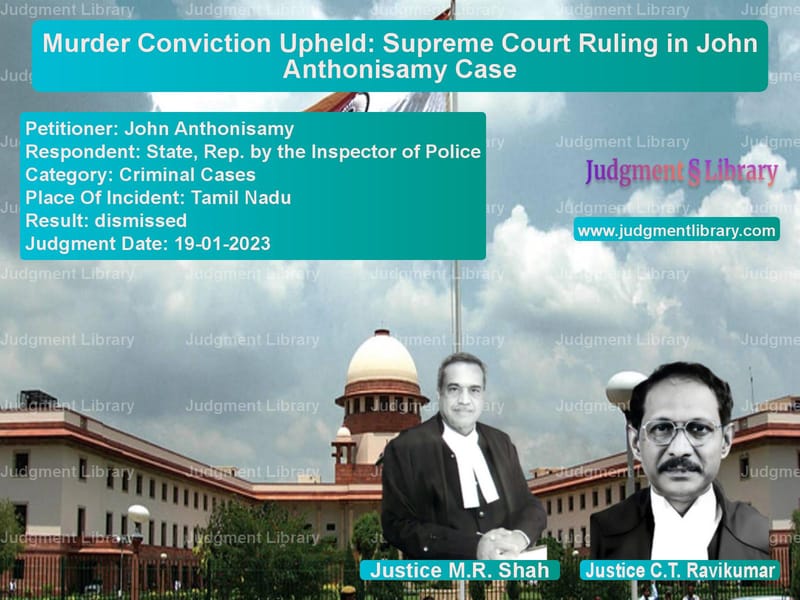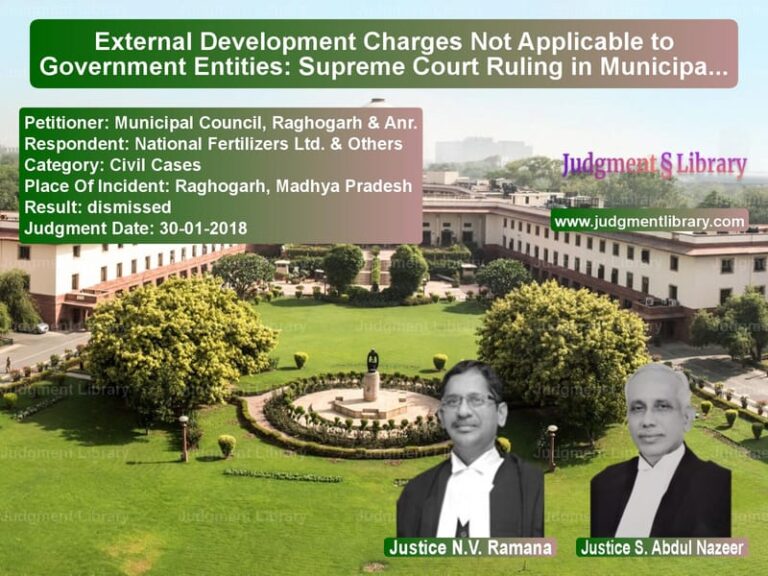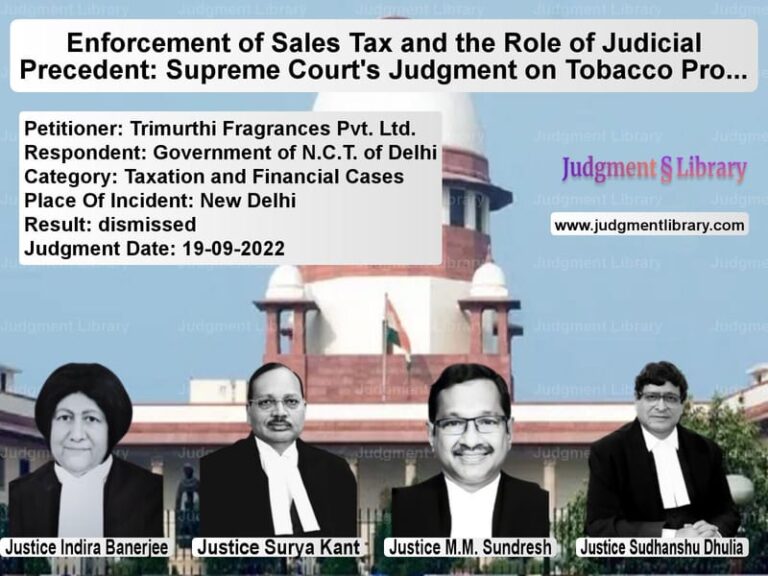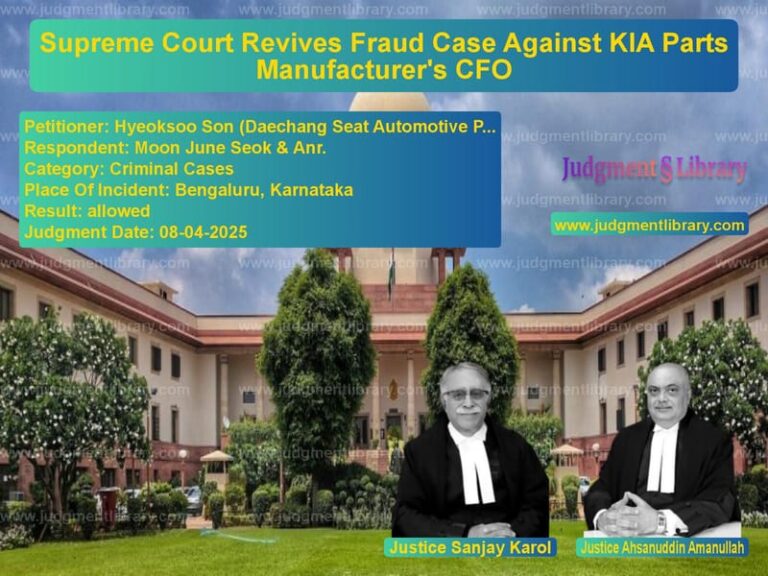Murder Conviction Upheld: Supreme Court Ruling in John Anthonisamy Case
The Supreme Court of India recently ruled in the case of John Anthonisamy vs. State, a significant criminal appeal concerning murder and theft. The case revolved around the conviction of the accused, who was found guilty of murdering a taxi driver and stealing his vehicle. The Supreme Court upheld the findings of the Trial Court and the Madras High Court, confirming the life sentence imposed on the accused.
Background of the Case
On June 26, 2006, the deceased, a taxi driver, left his house to work but never returned. The prosecution alleged that the accused, John Anthonisamy, and his accomplices planned to kill the driver and steal his taxi. The conspiracy was carried out on May 26, 2006, when the accused engaged the victim’s taxi, drove to an isolated place, strangled him, tied his hands and legs, and buried his body in a pit.
The case was initially closed due to a lack of evidence, but in 2007, a letter allegedly written by the accused surfaced, confessing to the crime. This led to the reopening of the investigation, the discovery of the victim’s remains, and the recovery of the stolen vehicle.
Arguments by the Appellant (Accused)
- The prosecution’s case was based entirely on circumstantial evidence, which did not conclusively prove guilt.
- The doctor who conducted the post-mortem was unable to determine the cause of death, making it impossible to establish homicidal intent.
- The alleged confessional letter was unreliable and had been rejected by the High Court.
- The dead body was discovered based on a prior confession by another accused (A-2), not the appellant, making the recovery inadmissible as evidence against him.
- The recovery of the car, engine, and gear box did not directly link the appellant to the murder.
- The appellant had already served 15 years in prison, and his conviction should be overturned.
Arguments by the Respondent (State)
- The dead body was exhumed from the location identified by the accused.
- The car was recovered based on the accused’s disclosure statement, proving his involvement.
- The accused had sold parts of the stolen car, further corroborating his role in the crime.
- The High Court correctly rejected the extra-judicial confession but relied on independent evidence proving guilt.
- The prosecution had successfully established an unbroken chain of circumstantial evidence leading to the inevitable conclusion of guilt.
Supreme Court’s Observations
- “The accused’s conviction is not based solely on the confessional statement but on strong circumstantial evidence.”
- “The place where the dead body was buried was identified by the accused himself.”
- “The stolen vehicle was recovered at the instance of the accused, linking him to the crime.”
- “The DNA examination and forensic evidence confirmed that the remains belonged to the deceased.”
- “The High Court was justified in relying on the circumstantial evidence to confirm the conviction.”
Final Judgment
- The Supreme Court dismissed the appeal and upheld the life sentence imposed on the accused.
- The Court ruled that the prosecution had successfully established a complete chain of circumstantial evidence leading to the accused’s guilt.
- The accused’s plea for leniency based on time served was rejected, given the gravity of the crime.
Legal Precedents Considered
- Sharad Birdhichand Sarda vs. State of Maharashtra (1984): Established that circumstantial evidence must form a complete chain leading to no other conclusion but the guilt of the accused.
- Krishnan vs. State (2011): Reiterated that recovery of a body at the accused’s instance is strong evidence of guilt.
- State of Rajasthan vs. Kashi Ram (2006): Confirmed that recovery of stolen property at the accused’s instance strengthens the prosecution’s case.
Implications of the Judgment
- The ruling reinforces the legal principle that circumstantial evidence can be the sole basis for conviction if it forms an unbroken chain.
- It underscores the importance of forensic and DNA evidence in criminal cases.
- The judgment serves as a precedent for future cases involving murder and theft where direct evidence is lacking.
- It highlights the judiciary’s commitment to upholding convictions in serious crimes based on strong circumstantial proof.
Conclusion
The Supreme Court’s decision in this case affirms the conviction of the accused based on a meticulously constructed chain of circumstantial evidence. The ruling sets a precedent for how courts should evaluate evidence in cases where direct witnesses are absent. By upholding the principles of justice and the rule of law, the judgment ensures that serious crimes do not go unpunished due to the absence of eyewitnesses.
Petitioner Name: John Anthonisamy.Respondent Name: State, Rep. by the Inspector of Police.Judgment By: Justice M.R. Shah, Justice C.T. Ravikumar.Place Of Incident: Tamil Nadu.Judgment Date: 19-01-2023.
Don’t miss out on the full details! Download the complete judgment in PDF format below and gain valuable insights instantly!
Download Judgment: john-anthonisamy-vs-state,-rep.-by-the-i-supreme-court-of-india-judgment-dated-19-01-2023.pdf
Directly Download Judgment: Directly download this Judgment
See all petitions in Murder Cases
See all petitions in Bail and Anticipatory Bail
See all petitions in Judgment by Mukeshkumar Rasikbhai Shah
See all petitions in Judgment by C.T. Ravikumar
See all petitions in dismissed
See all petitions in supreme court of India judgments January 2023
See all petitions in 2023 judgments
See all posts in Criminal Cases Category
See all allowed petitions in Criminal Cases Category
See all Dismissed petitions in Criminal Cases Category
See all partially allowed petitions in Criminal Cases Category







